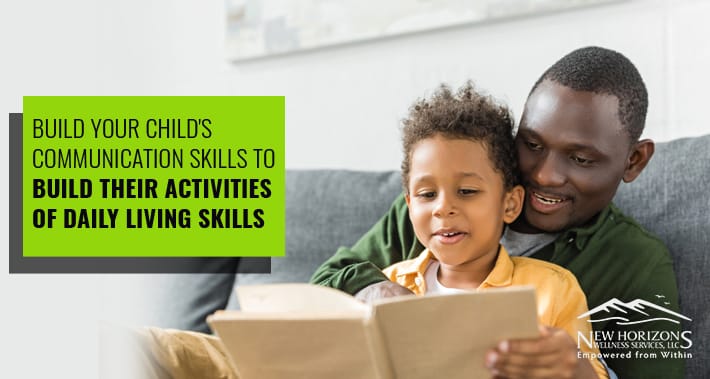
Children spend their days learning about the world around them. Whether that information comes from a classmate, a relative or a teacher, your child is constantly receiving, sorting and processing information about their surroundings. It’s this constant influx of information and your child’s ability to receive, evaluate and act on it that allows them to interact with the people and the world around them.
That information is the basis of their ability to learn and perform activities of daily living that range from simple to complex. As such, if your child is having issues navigating the social situations or relationships around them, it can have a negative effect on their communication skills as well as their ability to perform the basic activities of daily living. Here at New Horizons Wellness Services, we provide social skills group therapy that can help your child develop the skills they need to navigate the world around them.
This will allow them to perform the activities of daily living they need to live independently and successfully. Let’s take a look at activities of daily living and what they mean for your child’s ability to successfully navigate the world around them.
What are Activities of Daily Living?
As you go about your day to day life, you casually perform a number of daily tasks that get you from point A to point B. Brushing your teeth, getting dressed, pouring a glass of water – you do each of these and much more every day, often without much thought. And yet, simple or not, you wouldn’t be able to get through a single day without completing these sorts of tasks. These routine, self-care tasks are
what we call activities of daily living and form the building blocks of everyday life.Activities of daily living range in levels of complexity. Let’s take a look at the different categories.
Basic Activities Of Daily Living (ADL)
These include those activities that are basic and/or necessary to our survival.
They include:
- Feeding yourself
- Ensuring your own safety
- Getting dressed
- Basic hygiene and grooming
- Toileting
- Bathing
Advanced or Instrumental Activities Of Daily Living (IADL)
These include activities that enhance our physical and emotional well-being, as well as promoting our participation as full members of the community.
They include:
- Cleaning their room
- Caring for a pet
- Preparing and cooking meals
- Social and peer interactions
- Hobbies and recreational activities
- Being able to cross the street
- Having awareness of stranger danger
- Knowing who to ask for help
- Knowing when to ask for help
How Can Communication Skills Help Build Activities Of Daily Living?
As with many other things in life, your child must start with the basics. But they can’t develop these skills alone. It’s difficult to teach your child something new without communicating with them in a way they can understand. As such, communication is the most essential aspect of teaching.
And it becomes especially important as your child graduates from basic activities of daily living to more complex concepts and tasks. Let’s take a look at how you can support your child as they develop their activities of daily living skills.
1. Humans Learn Through Communication
Communication is the primary method of transferring essential knowledge and skills to your children. But there’s more to communication than just talking. That’s one form of communication, to be sure, but there are others, listed below. These forms of communication work most effectively in conjunction with one another, so a child who struggles grasping any form of communication may end up falling behind. If that’s the case, our pediatric speech therapists and pediatric occupational therapists can help. Let’s take a look.
Receptive Communication
Receptive communication is the act of receiving information. It can mean listening to somebody speak, or watching their signs if they use sign language. When you work with your child, it usually takes the form of you speaking directly to your child and them listening.
Expressive Communication
Expressive communication is the other end of receptive communication. In order for you to receive, someone else has to express. Between parent and child, it usually has to do with having your child answer questions, or ask you for more information about them.
Written Communication
This has to do with reviewing and interacting with written forms of information. Of course, this one is difficult to do before your child learns to read, but it can also include things like picture cards.
Non Verbal Communication
This is related to following non verbal cues or instruction, such as having your child physically copy a task you’re demonstrating.
2. Communication Issues Can Disrupt Executive Function
Executive function is the part of your brain that controls the skills you use to, essentially, get stuff done.
It means things like:
- Managing your time
- Planning and organizing
- Switching your focus
- Remembering specific details
- Multitasking
- Paying attention
Clearly, these are important skills to have. Because of how essential communication is to your child’s ability to learn, communication skills form the foundation for building their executive function. This can disrupt their ability to learn the basic activities of daily living. This breakdown in communication skills as well as executive functioning skills can lead to a number of behavioral issues. Executive functioning deficits have also been linked with ADHD. As a result, occupational therapy for ADHD often focuses on addressing issues of executive functioning as well.
3. Knowing How To Listen Is Critical For Living Independently
While all the forms of communication are critical for day to day living, receptive communication may very well be the most essential. As mentioned above, receptive communication has to do with your child’s ability to directly listen to information and grasp what’s being communicated to them. Research shows that receptive communication issues make it difficult to learn new things. So if your child struggles with receptive communication, they might have trouble learning activities of daily living.

How To Improve Your Child’s Communication Skills
Now that we have a better understanding of how important communication is to build activities of daily living skills, how can you as a parent help?
Let’s take a look
1. Practice Active Listening With Your Child
Active listening, or actively interacting with what someone is communicating, is essential for effective communication and deeper understanding of information. Practice active listening with your child by having them get used to thinking about what you tell them in a practice conversation and responding with a thought or follow up question. Your child following up on your comment on the snow outside by asking why it snows is a great example of active listening that leads to deeper understanding of the subject.
2. Explain Body Language To Your Child
Body language is a non verbal form of communication. As such, understanding the basics of body language is essential to understanding what the people around them are communicating. Practice identifying non verbal cues with your child and asking their opinions on what they think you’re trying to communicate. Asking something as simple as “what do you think I’m feeling when I’m crossing my arms?” can be enough to start them thinking about the non-verbal communication of those around them.
3. Read With Your Child
Reading with your child is a great opportunity for bonding, but there’s so much more to it than that. Reading with your child supports cognitive development, improves their imagination and concentration, and improves their communication skills. Whether your child enjoys a variety of different books or the same few ones over and over, you can still use this as an opportunity to help their communication skills.
Reading the same material over and over, after all, will allow them the opportunity to further develop their understanding of the characters and plot. Even if your child just fills in a word here and there while you read to them, it’s still going to help develop their communication skills.
4. Ask For Your Child’s Opinion On Things
Effective communication requires your child to share thoughts, feelings and opinions on what’s happening around them. As such, encouraging your child to contribute their takes to a conversation is a fantastic way to get them used to sharing. The conversation can be something as simple as asking what they’d like for dinner or what activity they’d like to do that day.
Also, encouraging your child to contribute their opinion on relevant topics such as their favorite part of a book can lead to an engaging conversation. Any discussion that uses “I think” or “I feel” statements is a great way to practice effective and successful daily conversation skills.
5. Above All Else, Talk To Your Child
If your child has issues communicating, they may not want to start or join in conversations at all. But as with anything else in life, practice makes perfect. Interacting with your child and encouraging them to communicate often can eventually lead to them being more comfortable communicating.
Demonstrate and help your child develop the ability to make conversation that is relevant to what is happening in the world around them. Discuss the scenery during a car ride, the weather during a walk or even the pictures on the wall while you wait in line at the bank. Communicational opportunities are everywhere.
Book Your Appointment With New Horizons Wellness Services Today
Do you believe that your child may benefit from better communication skills? If so, we can help. Book your appointment with New Horizons Wellness Services today.

Yours in Health,
New Horizons Wellness Services13333 SW 68th Pkwy,
Tigard, OR 97223
- https://g.page/newhws
New Horizons Wellness Services provides a true multidisciplinary approach to mental & physical health treatments for children, adults and families.